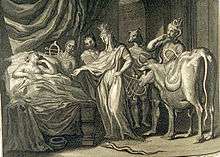Iphis
In Greek mythology, Iphis or Iphys (/ˈaɪfɪs/ EYE-fis, /ˈɪfɪs/ IF-iss; Ancient Greek: Ἶφις Îphis [íi.pʰis], gen. Ἴφιδος Ī́phidos) was the daughter of Telethusa and Ligdus in Crete.

Mythology

According to the Roman poet Ovid's Metamorphoses, Ligdus and Telethusa were a poor couple who could not afford a dowry if their unborn child was born a girl. Ligdus was forced to come to the conclusion that they had to kill his wife's child if it wasn't a boy. Telethusa despaired, but was visited in the middle of the night by the Egyptian goddess Isis, attended by Anubis, Bubastis and Apis, who advised her to accept whatever was going to happen after the child's birth, guaranteeing assistance to the woman. When Telethusa gave birth to a girl, she concealed her daughter's sex from her husband and raised her daughter as a boy. Ligdus named the daughter, who he believed was a son, Iphis after his own father (the child's grandfather), and Telethusa was glad to have her named that as the gender-neutral name would fit in any case. As Iphis reached the age of adolescence, Ligdus, still unaware of the truth, arranged for his "son" to marry the beautiful Ianthe, daughter of Telestes.
Unaware of the truth and taking her suitor for a man like everyone else did, Ianthe fell in love with Iphis. Iphis fell deeply in love with Ianthe, and prayed to Juno for assistance, as she wished to marry Ianthe, but knew it would be impossible as Iphis was actually a woman. One day before the wedding, the deeply concerned Telethusa brought Iphis to the temple of Isis and prayed to the goddess to help her daughter. Isis responded by transforming Iphis into a man. The male Iphis married Ianthe and the two lived happily ever after, their marriage being presided over by Juno, Venus, and Hymenaios, the god of marriage.[1]
The story of Iphis is similar to that of Leucippus from Phaestus, Crete, and could be a variant thereof.
In popular culture
- The 17th-century publisher Humphrey Moseley once claimed to possess a manuscript of a play based on the Iphis and Ianthe story, by William Shakespeare. Scholars have treated the claim with intense skepticism; the play has not survived.
- Ali Smith's 2007 novel Girl Meets Boy is based on Ovid's story of Iphis and Ianthe, and is part of the Canongate Myth Series.
- The Mechanisms' 2013 album Tales To Be Told features a song called "Iphis" based on the story of Iphis and Ianthe.
References
| Wikimedia Commons has media related to Iphis and Ianthe. |
- Ovid. Metamorphoses, 9. 666-797.